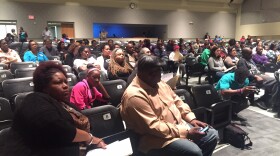Keeping kids focused on school is a challenge for any educator. Getting them to reach higher is even more challenging. As part of our Class of '17 series, we take a look at how a local law firm created an unusual alliance between private and public schools.
Attorney Bill Brewer remembers the time he went to South Dallas to pick up a group of 20 public school students. Riding on a bus, they headed to a private school in north Dallas. Brewer was struck by their reaction.
“Not one of those children had ever been out of their neighborhood,” Brewer said. “Not one of them had been past downtown Dallas. Not one of them had ever been in a skyscraper. When they got on the campus at St. Marks, you would have thought they had landed in Oz.”
An unlikely alliance
That was in 2001. The group was the first to participate in the Bickel & Brewer Future Leaders Program. More than a decade later, the initiative serves more than 250 students from 21 schools in the Dallas school district. Most of them come from low-income neighborhoods in South Dallas, West Dallas and Oak Cliff.
It’s an unlikely partnership between public and private entities. Every Tuesday and Thursday after school, students in fifth through 12th grades head to one of the participating private campuses. The students are picked by their schools based on criteria such as grades and leadership abilities. There are two teachers in each class: one public and one private. The ultimate goal: to get kids ready for college.
Alberto Rios, a ninth grader at the School of Science and Engineering Magnet at Yvonne A. Ewell Townview Center has been enrolled in Future Leaders, or FLP for short, since fifth grade. His parents didn’t finish high school. And like many of his peers, he could end up being the first in his family to attend college.
Meeting parents’ expectations
“The transition from eighth grade to ninth — it was very difficult at first because a lot more work was assigned, but FLP has helped me. It trained me over the summer how to take notes and be prepared for those AP classes,” Rios said, on a recent evening at St. Mark’s School.
Like Alberto, ninth grader Jazkira Combs, also knows what’s expected of her. She said her parents started college but never finished.
“That’s why my mom is so hard on me,” Combs said. “Well, I wouldn’t say hard, but she’s strict on me to go to FLP and to go to my school that I go to so than I can do better than her and — that’s my goal.”
Jazkira attends the Irma Lerma Rangel Young Women’s Leadership school. What sets these after school classes apart is the low student to teacher ratio, she said. There’s a teacher for every eight students.
More one-on-one attention
“I feel like I am more connected with my teachers rather than being at school with more students to one teacher,” Jazkira said. “And in FLP, I don’t feel like they’re just teachers. They become like second parents.”
Educators say it’s this one-on-one attention that can make a difference between a student staying in school or dropping out. Here, younger students focus on subjects like writing, math, science and technology.
“Eighth grade is kind of a big turning point for us because that conversation shifts,” said Executive Director Karen Bradberry.
She said the bar is raised for the older students.
“The idea is that by eighth grade, then we should be able to look at our results and go ‘Okay, so how well have we done? Have we closed the gaps that we saw and let’s start talking about high school and getting ready.”
Plans to expand
Attorney Bill Brewer said there are plans to expand so that as many as 500 kids can participate in FLP. Some of the alumni have gone on to law school and others work part-time in his office. It’s not the answer to all education woes, but he says it’s one way to help keep kids in school.
“We don’t need more teachers, we don’t need more buildings, we don’t need a wholesale change,” Brewer said. “What we do need is the will and the determination to create opportunities.”
That kind of thinking seems to have stuck with the students. When asked about his future plans, Alberto said he would try to do well on his SAT. Then, he corrected himself and said he would do well.
Students in FLP have attended schools such as The University of Texas at Austin, New York University, Amherst College and Southern Methodist University. They’ve received nearly $3 million in awards, including the Gates Millennium Scholarship, Dell Scholarship and Valedictorian State of Texas Scholarships. Below is a list Dallas public and private participating schools.













